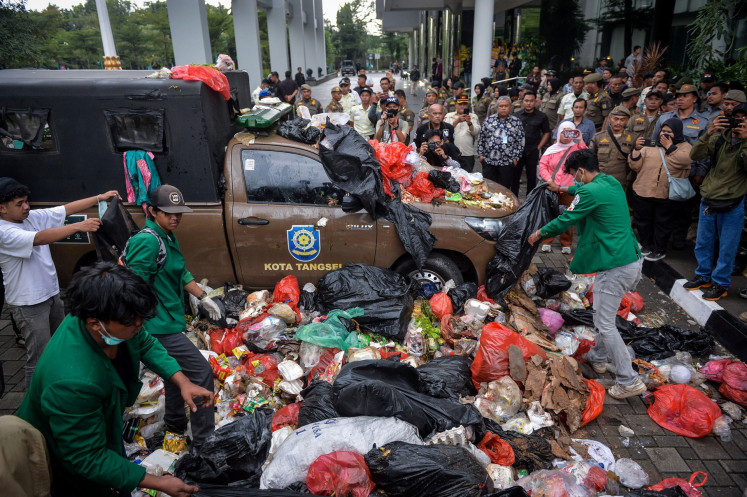Popular Reads
Top Results
Can't find what you're looking for?
View all search resultsPopular Reads
Top Results
Can't find what you're looking for?
View all search resultsWeaponizing data against democracy
Modi's visit to Washington has revealed the similarities between him and his US counterpart, while his decade-long model of prioritizing propaganda over governance hints at the kind of tactics to expect from a second Trump term, and the blinders his administration might voluntarily wear to avoid seeing the socioeconomic realities.
Change text size
Gift Premium Articles
to Anyone
F
or those of us who have witnessed the shock-and-awe tactics of Indian Prime Minister Narendra Modi over the past decade, the events unfolding in the United States since Donald Trump returned to the White House evoke a sense of déjà vu.
In India, we have learned the hard way that authoritarian leaders are often far more dangerous in their second term than in their first.
The reason is simple: By their second term, such leaders have mastered the system; they have learned how to bend institutions to their will and dismantle them when they no longer serve their interests, leaving them free to pursue their agendas aggressively.
Modi’s visit to Washington underscores the striking similarities between him and Trump. Both are known for sudden, unpredictable policy shifts, leaving opponents scrambling to respond and unsure of what comes next. Both leaders take pride in being disruptive, but selectively so. While they undermine institutions, discard long-standing norms and erode democratic safeguards, they also protect and reward their favored interest groups.
More importantly, their governing style is rooted in a politics of division and intolerance, designed to consolidate power and enrich oligarchic capitalists, whose interests and fortunes are inextricably linked to their own, at the expense of almost everyone else. Both rely heavily on manipulating public perception, using mass media to push their favored narratives and suppress dissent.
These tactics comprise the playbook for aspiring autocrats worldwide. However different they may seem, today’s authoritarian leaders study one another closely: not to govern more effectively, but to tighten their grip on power.
Control over data is at the heart of this effort, leading to a fundamental shift in how public information is accessed and used. Even as citizens around the world are increasingly forced to provide their personal data to authoritarian leaders and their allies, such as Elon Musk and his acolytes at the Department of Government Efficiency (DOGE), they are being denied access to the information needed to hold those leaders accountable.
Nowhere is this more evident than in India, where Modi’s government has systematically undermined and weaponized the country’s statistics authorities, once arguably the most reliable in the developing world.
First, it politicized the National Statistical Commission, originally an independent expert body responsible for verifying and overseeing the collection of official data. It then targeted the Central Statistics Office, which collects most economic data, effectively destroying the CSO’s credibility.
Using a routine revision of the base year for growth estimates as a pretext, the government altered the CSO’s methodology in ways that inflated growth, casting doubt on the reliability of official economic data. Similarly, the government abruptly withdrew the 2017-18 consumption expenditure survey, a key tool for assessing well-being, reportedly because it revealed declining consumption and rising poverty in rural India.
By the time the 2022-23 household expenditure survey was due, the government once again revised its methodology. Then, just before the 2024 general elections, it released a “factsheet” claiming that the poverty rate had fallen to 5 percent.
The government’s fear of reliable data is so extreme that it even refused to conduct the decennial census due in 2021, and has yet to confirm when it will take place. As a result, the most recent official data on India’s population, demographics, employment and living conditions are from 2011.
Likewise, audits of the government’s own policies and programs are suppressed or quietly buried when they produce unfavorable results.
For example, an official review of the Ganges River cleanup project was never released. During the COVID-19 pandemic, official mortality figures were widely challenged, with the government refusing to acknowledge independent estimates of excess mortality from the World Health Organization.
Even the National Family Health Survey, conducted by the Ministry of Health and the semi-independent International Institute for Population Sciences (IIPS), has not been spared. After a report highlighted poor nutrition levels and inadequate sanitation services, the IIPS director was forced to resign, ostensibly over an unrelated matter. The message to researchers was clear: Contradict the government’s preferred narrative at your own risk.
The 2005 Right to Information Act, a landmark transparency law passed by the previous Indian National Congress-led government, also has been hollowed out. Modi’s government has deliberately left key positions vacant and appointed only people who yield to political pressure, thereby ensuring that most petitions go unanswered.
The government’s efforts to evade accountability have been largely successful. But by prioritizing propaganda over governance, it has blinded itself to India’s economic and social realities, impeding its ability to make informed policy decisions.
At the same time, Indians are being forced to surrender more personal data than ever, thanks to the expansion of Aadhaar, a biometric identification system now linked to their bank accounts, tax returns, mobile phone numbers, travel records and major transactions. This system has had devastating consequences, as fingerprint mismatches have led to millions of Indians being denied wage payments, food allowances and other essential services.
Yet despite the risks, India still has not implemented a framework for data protection.
With no oversight, data breaches are rampant. And given that Big Tech, which already hold vast amounts of personal data, have aligned themselves with the government, the consequences could be catastrophic.
To be sure, the US may not follow India’s political trajectory. Its institutions, especially the judiciary, may provide some protection; as long as they hold firm and do not crumble as they did in India.
But with authoritarianism on the rise, we must recognize and resist efforts to weaponize government data against democracy.
---
The writer is an economics professor at the University of Massachusetts Amherst, a member of the Transformational Economics Commission led by The Club of Rome and cochair of the Independent Commission for the Reform of International Corporate Taxation.











